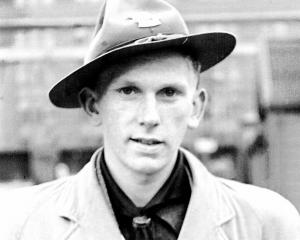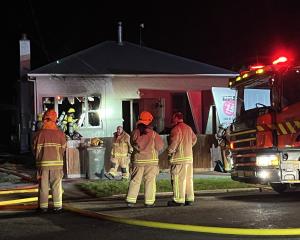The Oamaru Performing Arts Society's 79th Annual Festival runs for three days at the Oamaru Opera House in Thames St, from yesterday until tomorrow.
About 270 competitors from under-6 to open will compete in six disciplines at the festival. This year's adjudicators are: speech, Dinie Bevers, from Rangiora; vocal and instrument, Charles Levings, from Christchurch; ballet, Lynette McIlwaine, from Auckland; tap dancing, Molly Chapman, from Christchurch; and Highland and national dancing, Jayne Puanaki, from Invercargill.
Taking care of all the hardware for the festival is cup custodian Carol Selfe (76), who performed at the festival each year from when she was a child until she was 15. The born-and-bred Oamaruvian with a Scottish mother has become the first of three generations of Otago highland dancers.
Mrs Selfe has lived in her Tay St house for 55 years and with her husband Tony Selfe together they have four daughters, who all performed at the festival. Mrs Selfe has 10 grandchildren and four of her five granddaughters are performing at this year's festival: Kendyll (21) and Mackenzie Taylor (19) and Tannah (20) and India McLay (15).
When the festival cups are returned by the previous year's winner in March, Mrs Selfe, who has been looking after the silverware for 13 years, begins sorting and cleaning the roughly 200 trophies and awards.
Hamish MacLean caught up with her to find out about the festival, the performing arts society and the performing arts community in North Otago.
Q. What is your background in the performing arts?
A. I danced when I was young. I was a skinny little kid that wouldn't eat. So the doctor said to Mum ... she suggested I was sent to dancing. Look at me now. [My daughters] started when they were 4 and they loved it.
Q. What is your strongest memory of past festivals?
A. In my day there were about 50 in the classes and I remember sitting down in the audience, all lined up and sitting in the seats. We were taken up when it was our turn, taken up to the side of the stage, because 50 was too many standing around the back of the stage. I can remember being lined up. I can't tell you about the tap or the ballet, but the classes were much larger than they are now.
Q. What are you looking forward to most at this festival?
A. Just the enjoyment. The ballet and the tap, I enjoy their music. The music, it's different from the pipes, I enjoy the music for a change. I don't know what it's like in the audience. We're tucked in the side. The kids usually all come on the stage from the other side. It's all busy, busy.
Q. Would you have any advice for the younger competitors?
A. Just get up and enjoy it, just enjoy it. It's nice to win, but [performing] gives them confidence, which rubs off on other things. I feel it rubs off on school and in sport. It's quite a commitment, but it passes very quickly and they make wonderful friends. They make friends and meet people - there's more to it than just competing, it's the friendships they make other than their school friends.
Q. What is your wish for the Oamaru Performing Arts Society?
A. Younger members and for it to continue. For teachers to encourage their pupils to compete or to perform.
Q. Do you think the festival will reach the 100th annual festival?
A. I don't see why not. As long as you've got the teachers in the district to teach. Speech has improved out of sight, because, I think, we've got a new, younger teacher, and probably she encourages them to enter.
The teacher has got to encourage [pupils] to enter and you have got to have a mother, or parents, interested in competing. If the teacher encourages them to compete and puts the work into them that's great. [And there are] younger teachers; it looks good, it looks good for the future.
We say, the more competitions the kids do, the better they get. The more dancing they do, the more competing they do, the better they are. They put their best foot forward when they're competing.












